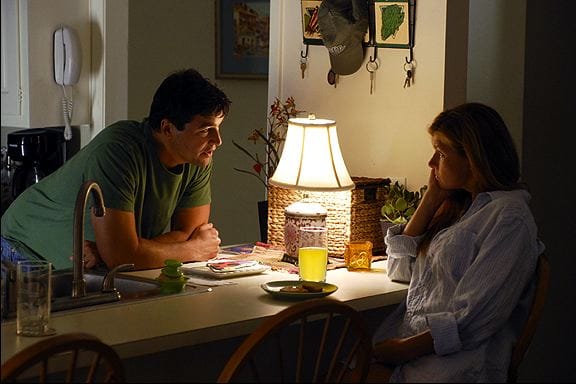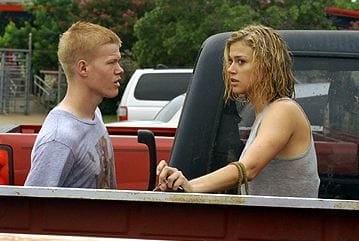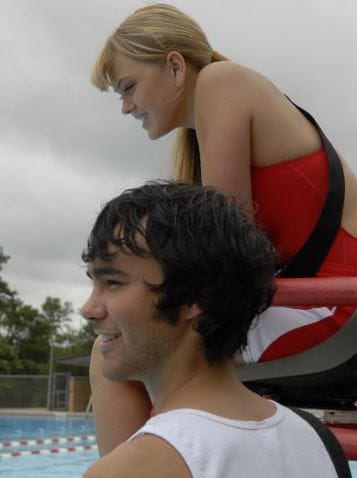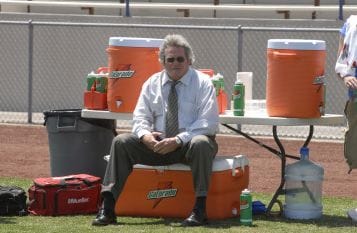
Very long thoughts on the "Friday Night Lights" season two premiere coming up just as soon as I swim a few laps...
I almost feel like I should be writing two different blog posts here: one about The Bad Thing (Landry killing the rapist and then, with Tyra, dumping the body in the river), which I hated, and another about the rest of the episode, which I loved.
But "Friday Night Lights" has always been about the whole, not just the parts, and one subplot affects all the others, in spirit of not always in action. The problems in the Taylor marriage, or between Julie and Saracen, or the friction generated by the new coach may not be directly touched by this idiotic, "I Know What You Did Last Summer" by way of "One Tree Hill" plot with Landry and Tyra, but there's a butterfly effect at work. Once you know that the show is willing to go to this place, it changes how you look at the entire series. As I wrote in the column, the key to the show is how Katims, Berg and company have created this grand illusion that Dillon is a real place, that Coach, Mrs. Coach, Smash and the rest are real people, and that gives the storylines emotional weight that goes beyond any one individual script or performance. The murder/corpse-disposal plot, above and beyond what it does to Tyra and Landry -- and believe me, we'll get back to that -- loudly shouts that, this season, "Friday Night Lights" is more than capable of being Just Another TV Show, and if it doesn't ruin my enjoyment of Connie Britton or Kyle Chandler or Brad Leland yet, it makes me less eager to see where everything's going.
Before I go into more detail about the murder storyline and then move on to the many good parts of the episode, I want to present a longer version of my interview with Jason Katims, which I had to dance around in the column for spoiler protection reasons. It's long, so feel free to scroll past it if you just want my take on the show.
ALAN SEPINWALL: While I loved a lot of the episode, especially scenes like Eric and Tami arguing on the couch about when he had to go back to TMU, I was really concerned about the developments in the Tyra and Landry storyline. Can you talk about how that story developed, and what you're trying to do with it?
JASON KATIMS:
AS: NBC only sent out the premiere.
JK:
AS: Okay, but for argument's sake, when you talk about wanting to introduce Landry's father, you're already doing this story where Landry tries out for the football team, and you could introduce his father there, and this (the murder) kind of overwhelms that. Couldn't you have just done the football tryout story?
JK:
AS: I just worry that I'm not going to be able to look at Landry the same way again. Regardless of what they did with the body, I don't know that a Landry who killed somebody can still be Landry.
JK:
AS: Obviously, some fans have already seen the episode on Yahoo!, and a lot of them seem unhappy with this direction. Is there anything you would say to them right now to reassure them?
JK:
A few days later, NBC sent out episodes two and three, and, as I said in the column, they didn't provide the reassurance that Katims had promised. I'm not going to spoil them, either, except to borrow a phrase from the comic books of my youth, and say that the later episodes show that the murder and cover-up is not a dream and not an imaginary story. The second episode doesn't open with a flashback to Tyra and Landry driving the body up to the nearby emergency room and discovering that rumors of the rapist's demise were greatly exaggerated by Landry's pulse-taking abilities. Nor is it the rapist emerging from a shower, Landry telling Matt about this wacky dream he had about killing a guy, Tyra handing in a creative writing assignment about it, or anything else that, while completely lame, would get the show out of this corner it's painted these two characters into.

The version I initially saw was staged a bit differently than what aired, in that Landry brained the rapist with a beer bottle while the fight was still going on, where in the final version, he beats the guy with a lead pipe after the rapist is already walking away. Either version has problems: the original because there's absolutely no reason for Landry to not call the cops (especially with his dad on the force), the final because it takes away the "defense of others" justification for Landry's actions and makes the killing far, far worse.
Either way, I'm not happy. Hell, take away the cover-up altogether, and I'm still not happy. I'm simply not interested in a Landry Clarke who has a death, justified or not, on his conscience. That takes away so much of what made Landry one of the richest characters on the show: the everyman quality; the sense of humor (though episode two clumsily tries to have it both ways with a few scenes where Landry cracks wise like always); the notion that, while he may have a brighter future than some other characters, for the moment his life lacks the glamour of a Smash or Riggins or even his buddy Matt. Katims talks about this storyline adding a grandness to the show, but that seems to be missing the point of Landry, who used to be defined by his complete lack of grandness.
Worse, though, is the sense (which becomes clearer in the later episodes) that this ridiculous, over-the-top subplot is really there just as an excuse to do other things like bring Landry and Tyra closer together or to introduce Landry's dad -- things that could have been accomplished without making Landry a killer and Tyra his accessory in covering it up.
Maybe by episode five, six, seven, whatever, something will happen to prove me wrong. Maybe there will be some kind of extraordinary scene between Landry and his old man that would be impossible without this set-up, I don't know. But it would have to absolutely eclipse all of the previous best moments in the history of the series -- Tami and Julie have The Talk, Tami's speech at the pre-championship dinner, Saracen singing "Mr. Sandman" to his grandma, the Panthers getting pelted with garbage, etc. -- to remotely justify the damage I think it's already doing.
I understand that the ads the last few days have been mentioning a murder. Maybe that brings enough eyeballs to the set this evening to keep the show on the air a while. But, as with all the serial killers and hottie detectives who drifted through latter-era "Homicide," I'm not sure that extending the show's lifespan is necessarily worth the cost of tarnishing the perfection we got last year.
Whew. And that's about 2000 words about one scene (1,000 if you take out the interview portion). Can you tell this has been consuming my thoughts for a while? Let's move on, so I can end this post on a more positive note.
What more can I say about the brilliance of Connie Britton? You want to talk about a dedication to realism, they don't get realer than Mrs. Coach. Plenty of brilliant moments from her, but I want to focus on two: the delivery room scene and the silent fight in the Taylor living room after Eric finds out he has to go back to Austin, immediately. Both of them are of a type that's an awards show cliche -- woman gives birth, woman breaks down crying -- but Britton immerses herself so deeply into the part that it never seems like Emmy-bait (not that the lame Emmy voters would notice), just how Tami would behave in that situation. I'm not sure I can remember another actor conveying exhaustion as well as she did when she greeted Eric in the delivery room, and the woman kills me very time she cries, dominating a scene where she barely opens her mouth. (She can cry funny, too, which you'll see next week.)
Kyle Chandler, meanwhile, has his own "a good expression's worth a few pages of dialogue" moment in the scene where Coach runs into Saracen at the supermarket and has to listen in silence as Matt runs down the ways McGregor is changing (ruining?) the team that Eric built. You know that Eric wants to say something, even as you know that he can't. It's not his place anymore -- he gave up that place to go be at TMU. Plus, he had another one of his hysterical deliveries of a line that's not very funny on the page, with the way he sneered "You've gotta be kidding me" when he had to pick up Julie at the club after curfew.

Speaking of which, I know some of the people who watched the episode on Yahoo! have complained about Julie flirting with The Swede and distancing herself from Matt, but I liked it. Not only do I recognize her fear of turning into her mom -- especially at a time when her mom's in a bad way, seemingly abandoned by her dad -- but, as she points out, she's 16. You do stupid stuff at 16, try on different identities, different relationships, whatever. It feels realistic that Julie would drift away from Matt through no fault of Matt's, and also that she'd be drawn to some slightly older guy who's the lead singer in a band. It happens, and, like Coach, it doesn't make me like her any less -- even though it makes me feel sorry for her that she doesn't realize how good she has it with Matt.
Outside the Taylor family and Bonnie and Clyde, our other regulars are in the process of either adopting new identities or falling back into old ones.
On the backsliding tip: Smash (not that he has much to do in this episode -- or the next two) is back to being the cocky guy he was back in the pilot, if not moreso, since he doesn't have a mobile Jason Street to overshadow him like he did a year ago; and Riggins is back to drunken bimbohood. (In terms of the women they were attached to at the end of last season, Waverly's gone -- Katims decided they broke up sometime between "State" and this episode -- while Jackie the MILF will be back in some capacity soon.)

Trying to be different: Street's still struggling to fit in as a coach, and while MacGregor for the most part seems like a tool, his advice about being a coach or a friend/mascot, but not both, felt just about right. Lyla's trying to deal with the crumbling of every relationship around her (including her own lifelong romance with Street) by giving herself to Christ, while her mom's new boyfriend is driving Buddy to make an even bigger ass of himself than usual. (Mo Ryan made a great comparison in an e-mail to me the other day, when she said that Brad Leland/Buddy is to "FNL" as Michael Hogan/Col. Tigh is to "Battlestar Galactica," the older, unglamorous guy who seems like a sleazy afterthought and then becomes an essential part of the fabric of the show.)
In looking at some of the last few paragraphs, reliving Tami and Eric's fight, Eric picking up Julie at the club, Buddy picking a fight in the dealership lot, even Riggins and Lyla's snotty conversation about how they spent their summers, I really want to put aside my misgivings about the murder subplot. I want to be able to divorce that storyline from the rest of the show. But all I know is that, when that DVD screener arrived a few weeks ago, I could not have been more excited to watch it, and I literally felt nauseous when it was over. Episodes two and three are going to have some equally brilliant stuff (as well as, unfortunately, some non-Tyra/Landry plots that feature varying levels of cheese), but when I got to the end of each one, all I could think about was how mad I am about the latest Tyra/Landry scene.
I've seen reviews by other critics who either seemed unconcerned by that storyline or not willing to let it affect their enjoyment of the rest of this great, great show. I wish I could be like that, but I keep thinking back to that sinking feeling in the pit of my stomach as the final minutes of this episode unfolded, and it makes me sad.
Live fast, die young, leave a good-looking corpse. Who knew we'd be dealing with a genuine corpse right at the start of season two?
What did everybody else think?
